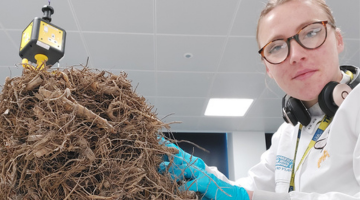2024/25 entry
BSc (Hons) Environmental Science with Foundation Year
Clearing
Want to study with LJMU this September? Visit our Clearing hub to apply now if you have your grades or register your interest and become a Clearing Insider to receive updates while you wait for your results. Your journey starts with Clearing.
Minimum UCAS points required: TBC
Why study Environmental Science with Foundation Year at Liverpool John Moores University?
- The course covers the major challenges currently facing the environment and solutions to tackle them
- Fieldwork is integral to the course, with field trips to Greece, the Lake District, North Wales and the North West coast included in fees*
- Access to state-of-the-art computing facilities and analytical equipment
- Prepares you for a career in the expanding green jobs employment sector, with excellent employment opportunities in areas such as: environmental management; government authorities; engineering and surveying; civil service; and Geographical Information Systems
- Taught by experienced, research-active staff
- Focus on skill acquisition via practical workshops and field learning
- Options to undertake work placements of 4-6 weeks and/or a 12 month sandwich year
- Options to study abroad for part of the degree
- International Foundation Year course available offering direct progression onto this degree programme
About your course
The environment is currently facing major challenges, such as climate change, pollution and decreasing biodiversity. Studying BSc (Hons) in Environmental Science with Foundation Year will allow you to investigate the challenges we are facing and learn how to tackle these pressing issues for future populations.
About the Foundation Year
The Foundation Year is ideal if you have the ability to study for a degree but don't have the qualifications to enter directly onto the Environmental Science honours degree programme. Once you pass the Foundation Year you will progress directly onto the first year of the honours degree. If you are a full-time UK student, you will qualify for student financial support for the full duration of your course (subject to eligibility criteria).
About BSc (Hons) Environmental Science with Foundation Year
Exploring the way in which our physical environment develops and how humans affect natural processes and interact within the world form the basis of the course. This is a highly practical programme that provides you with ample background and practical knowledge for understanding environmental processes and interactions. It also offers plenty of opportunities to apply your knowledge in practical contexts. Fieldwork, completed both in the UK and overseas, is integral to the course, with field trips to Greece, the Lake District, North Wales and the North West coast included in fees.
This programme will provide you with the skills and knowledge to address these issues, and prepare you for entry into the expanding green jobs employment sector. You will acquire skills and knowledge through practical learning and use of LJMUs state-of-the-art facilities, such as Geographical Information Systems facilities and analytical equipment.
"We are living in a world threatened by climate change, pollution and decreasing biodiversity. We need Environmental Scientists to help us tackle these issues"
Fees and funding
There are many ways to fund study for home and international students
Fees
The fees quoted above cover registration, tuition, supervision, assessment and examinations as well as:
- Library membership with access to printed, multimedia and digital resources
- Access to programme-appropriate software
- Library and student IT support
- Free on-campus wifi via eduroam
Additional costs
Although not all of the following are compulsory/relevant, you should keep in mind the costs of:
- accommodation and living expenditure
- books (should you wish to have your own copies)
- printing, photocopying and stationery
- PC/laptop (should you prefer to purchase your own for independent study and online learning activities)
- mobile phone/tablet (to access online services)
- field trips (travel and activity costs)
- placements (travel expenses and living costs)
- student visas (international students only)
- study abroad opportunities (travel costs, accommodation, visas and immunisations)
- academic conferences (travel costs)
- professional-body membership
- graduation (gown hire etc)
Funding
There are many ways to fund study for home and international students. From loans to International Scholarships and subject-specific funding, you'll find all of the information you need on our specialist funding pages.
Practical and field activities underpin all programmes in the School. PPE is provided for all necessary practical work. There are no costs for day field trips for core and optional modules. Residential field trips associated with core modules are subsidised and include travel and half-board accommodation costs. Any residential field trips for optional modules will have costs involved. Locations may be subject to change and also subject to national and international travel restrictions. A DBS check is not required for your application, however a DBS may be required for modules where there is a work based learning placement option. Work based learning placements that do not require a DBS check are available.
Employability
Environmental Science graduates have a broad range of career prospects in the expanding green jobs employment sector.
Graduate opportunities include all areas of environmental monitoring, management, as well as consultancy roles in the water, resources and sustainability sectors. Example roles include working as Environmental Consultants operating in multi-national consultancies and operational government authorities such as the Environment Agency and Natural England. Beyond the directly applied career opportunities, graduates can gain employment in teaching, the civil service and a range of Geographical Information Systems and analyst-related roles across non-environment employment sectors.
Student Futures - Careers, Employability and Enterprise Service
A wide range of opportunities and support is available to you, within and beyond your course, to ensure our students experience a transformation in their career trajectory. Every undergraduate curriculum includes Future Focus during Level 4, an e-learning resource and workshop designed to help you to develop your talents, passion and purpose.
Every student has access to Careers Zone 24/7, LJMU's suite of online Apps, resources and jobs board via the LJMU Student Futures website. There are opportunities for flexible, paid and part-time work through Unitemps, LJMU's in-house recruitment service, and we also offer fully funded Discovery Internships.
One-to-one careers and employability advice is available via our campus-based Careers Zones and we offer a year-round programme of events, including themed careers and employability workshops, employer events and recruitment fairs. Our Start-Up Hub can help you to grow your enterprise skills and to research, plan and start your own business or become a freelancer.
A suite of learning experiences, services and opportunities is available to final year students to help ensure you leave with a great onward plan. You can access LJMU's Careers, Employability and Start-up Services after you graduate and return for one-to-one support for life.
Go abroad
LJMU aims to make international opportunities available to every student. You may be able to study abroad as part of your degree at one of our 100+ partner universities across the world. You could also complete a work placement or apply for one of our prestigious worldwide internship programmes. If you wanted to go abroad for a shorter amount of time, you could attend one of our 1-4 week long summer schools.
Our Go Citizen Scheme can help with costs towards volunteering, individual projects or unpaid placements anywhere in the world. With all of these opportunities at your feet, why wouldn’t you take up the chance to go abroad?
Find out more about the opportunities we have available via our Instagram @ljmuglobalopps or email us at: goabroad@ljmu.ac.uk.
A life-changing experience
There's so much more to university than just studying for a degree.
News and views
Browse through the latest stories and updates from the University and beyond
What you will study on this degree
Please see guidance below on core and option modules for further information on what you will study.
Further guidance on modules
Modules are designated core or optional in accordance with professional body requirements, as applicable, and LJMU’s Academic Framework Regulations. Whilst you are required to study core modules, optional modules provide you with an element of choice. Their availability may vary and will be subject to meeting minimum student numbers.
Where changes to modules are necessary these will be communicated as appropriate.
Level 3
Core modules
Anatomy and Physiology
20 credits
This module enables you to examine the concepts of homeostasis, communication and transport within organisms. It also provides an introduction to human functional anatomy using a systemic approach to the organisation and function of organs and tissues in the human body.
Level 6
Core modules
Environmental Modelling and GIS
20 credits
The aim of this module is to provide you with a critical understanding of different environmental modelling techniques and to develop skills in the selection and application of appropriate models to investigate a range of environmental phenomena.
Optional Modules
Contemporary Issues in Conservation
20 credits
This module enables you to examine a diverse range of important contemporary research topics linked to conservation biology, drawing on the research interests of the teaching staff.
Renewables and Low Carbon Futures
20 credits
Within this module, you will examine the relationship between energy systems, society and contemporary environmental challenges and how a low-carbon energy future can be achieved. The module will aid your understanding of the environment and social benefits and limitations of different kinds of energy generation resources and technologies. It will also outline the key factors in moving to a 'low-carbon' energy future in a way that is socially equitable and sustainable.
Teaching and work-related learning
Excellent facilities and learning resources
We adopt an active blended learning approach, therefore teaching includes classroom, laboratory and field-based learning. A fully hands-on approach is taken, with emphasis on the development of practical skills across a wide range of subjects alongside substantial knowledge development. GIS and development of computer literacy is an important component.
Support and guidance
Dedicated personal tutor, plus study skills support
All students are allocated a personal tutor to provide academic support and pastoral guidance throughout all years of study. Tutor groups typically have 5-8 students, and meet for regular (fortnightly) tutorial meetings discussing course material linked to academic and transferable skills with fellow students.
The school is fully committed to promoting a learning environment that supports a culture of equality, diversity and inclusivity (EDI) and has a Disability Support Coordinator, an EDI Coordinator and a School EDI Working Group. Personal Tutors also play a vital role in promoting awareness of support services for students.
Assessment
Assessment varies depending on the modules you choose, but will usually include a combination of exams and coursework.
Assessment varies across the course and is scheduled across the semesters. The assessment types will be varied and include in-class tests, essays, scientific reports, oral presentations, poster presentations, blogs, presentations and more. Feedback will be provided following standard university procedure and will include bespoke marking criteria for each assessment type.
Course tutors
Our staff are committed to the highest standards of teaching and learning
Dr Jon Dick
Programme Leader
Jon's background is in Earth Science. He studied BSc (Hons) Geology at the University of Durham and a PhD in Hydrology at the University of Aberdeen. Since completing his PhD, the bulk of Jon's work has focused on hydrology and environmental modelling, however more recently he has branched out into microplastic pollution. Jon's research interests are mainly in the field of hydrology, focusing on how hydrometeorological conditions affect water as it moves through the landscape and the chemistry of that water when it arrives in our rivers.
I absolutely love teaching. Our programmes are heavily practical based. The experience of being able to support students through practical work and see them learn is highly rewarding
Facilities
What you can expect from your School
You will study at the Byrom Street site in the university's City Campus in the heart of Liverpool. You will have access to first class teaching facilities, laboratories and study areas. The Avril Robarts library is within easy walking distance and here you'll find all the information you need to support your studies.
The university reserves the right to withdraw or make alterations to a course and facilities if necessary; this may be because such changes are deemed to be beneficial to students, are minor in nature and unlikely to impact negatively upon students or become necessary due to circumstances beyond the control of the university. Where this does happen, the university operates a policy of consultation, advice and support to all enrolled students affected by the proposed change to their course or module.
Further information on the terms and conditions of any offer made, our admissions policy and the complaints and appeals process.











